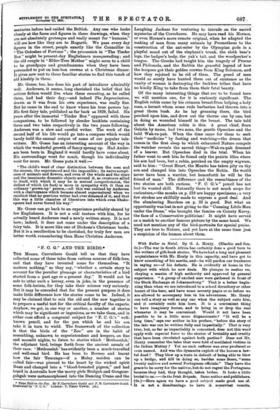With Buller in Natal. By G. A. Henty. (Blackie and
Son. 6s.)—The war in South Africa has certainly done a good turn to the writers of gift-book stories. We have had a long and pleasant acquaintance with Mr. Henty in this capacity, and have got to know something of his merits, and—he will pardon our frankness in saying so—of his defects. He is evidently at home in the subject with which he now deals. He plunges in medics res, obeying a maxim of high authority and approved by general experience. " A group of excited men were gathered in front of the Stock Exchange at Johannesburg." That is a better begin- ning than when we are introduced to a school dormitory or other haunt of the hero, and have some seventy pages or so before we are allowed to accompany him in his adventures. Mr. Henty can tell a story as well as any one when the subject snits him, and it certainly snits him here. It is a convenient thing to have imaginary heroes, and to bring in or drop the real whenever it may be convenient. Would it not have been possible to be a little more dispassionate P " It will be a long time," says our author in his preface, "before the story of the late war can be written fully and impartially." That is very true, but, as far as impartiality is concerned, does not this word apply with especial force to the stories of brutality and cruelty that have been circulated against both parties ? Does not Mr. Henty remember the tales that were told of mutilated victims in the Indian Mutiny ? Yet no such sufferer was ever produced or even named. And was the dynamite exploit of the heroes a law- ful deed ? They blow up a train in default of being able to blow up a bridge, and kill in doing so, besides some Boers, "some twenty natives and several Portuguese officials." They have the grace to be sorry for the natives, but do not regret the Portuguese because they had, they thought, taken bribes. It looks a little brutal to us. In the Irish Brigade. Same author and publishers. (6s.)—Here again we have a good subject made good use of. It is not a disadvantage to have it somewhat remote. though, indeed, its connection with present things is not difficult to see. But the Irishmen who served our foes in France and Spain during the evil days of an intolerant ascendency we can admire without any arriere pensee. They were of the same breed as the Irishmen who have done such work during the last year. And they, too, at least in Mr. Henty's pages, think and speak kindly of us. Mr. Henty varies his scenes with rapidity. His heroes go through even more than the average number of striking and dangerous adventures, and reach at last " the haven where they would be."—With Rifle and Bayonet. By Captain F. S. Brereton. (Same publishers. 5s.) —We do not often avail ourselves of the ready-made critiques with which we are sometimes supplied. (The other day we had a paragraph suggested in the actual form in which it might ap- pear.) But we may quote the following : " Captain Brereton, who is now on active service in South Africa, has probably the unique distinction of publishing, while on duty at the front, a romance of the present Boer War." The hero begins, after the manner of these tales, with an escapade at school. True, we find ourselves at Johannesburg in the course of forty-two pages, bat the war does not begin for some eighty more. Then the action becomes brisk enough. It is anyhow a story which we can read with more satisfaction than we could have read anything on the same subject twelve months ago.























































 Previous page
Previous page